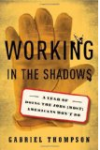While immigration may not dominate the headlines, it’s one of those issues that simmers under the surface and rises to the top with just the right news story. Such was the case with the now well-known yarn of the Pulitzer Prize-winning journalist who outed himself as an illegal in a recent issue of the New York Times Magazine. A new paperback released this week, Working in the Shadows : A Year of Doing the Jobs [Most] Americans Won’t Do, tells a similar story. The book is written by a white, American, Spanish-speaking journalist who spent a year doing migrant jobs.
In Working in the Shadows, Gabriel Thompson, a journalist who covers Latino culture, decides to go undercover and work several migrant jobs for two months at a time and detail his experiences. Thompson’s various jobs provide for eye-opening journalism. The work — he cuts lettuce in Yuma, tears chicken breasts at a poultry plant in Alabama, shuffles flowers and delivers food in New York City — is physically demanding and emotionally taxing. The hours are as long as the pay is small. Thompson’s reporting sheds light on dreadful migrant labor conditions — his peers in the bike-delivery industry are severely underpaid and overworked — but the political undertones in his book reek of common liberal arguments on the issue.
Those arguments have been popping up everywhere lately, since Jose Antonio Vargas — a Filipino shuffled in with fake papers who didn’t realize until his teens that he was, in fact, undocumented — came out in his 4,500-word piece. Vargas’ story is not entirely uncommon, but it is rare that someone of his profile — he shared the Pulitzer Prize with a group of Washington Post reporters for coverage of the Virginia Tech shootings — should out himself purposefully. Vargas spends most of his first-person narrative describing the logistics of maneuvering through typical American stepping stones, hurdles to him— Social Security cards, driver’s licenses, job applications — while declaring that his motivation was pure : He believed if he just contributed to American society in a major way, he would "earn" citizenship. It provokes a debate about self-worth as much as it does about immigration, but his attempts to solicit empathy about his hidden life grow tiresome and by his article’s conclusion incite the opposite emotion.
Writes Vargas : "There are believed to be 11 million undocumented immigrants in the United States. We’re not always who you think we are. Some pick your strawberries or care for your children […] I grew up here. This is my home. Yet even though I think of myself as an American and consider America my country, my country doesn’t think of me as one of its own."
No, America doesn’t. Just as scribbling down a few paragraphs does not a Pulitzer-Prize winner make. Never does Vargas contemplate that immigration restrictions exist for reasons that have little to do with him personally. This same mindset plagues Working in the Shadows (to which Vargas would probably give two thumbs up.)
Thompson uses his experiences to highlight both labor and immigration reform. It hardly seems fair to him that so many migrant workers — legal and illegal — are performing jobs Americans won’t do, yet their compensation, emotionally and financially, remains small. Indeed, many Americans won’t cut lettuce in the blistering Arizona sun for twelve hours a day, but then, many migrant workers aren’t willing to stay in their home country earning $10 a day for the same work, when they can earn nearly $9 an hour in Yuma.
Vargas tried to "earn" American citizenship through his vocation. Ironically, the migrant workers Thompson gets to know do as well. Both the undocumented and guest workers he meets seem glad to earn American wages with which they can support themselves and even loved ones back home.
Both Vargas’ and Thompson’s tales testify that in the right context, hard work and upward mobility go hand in hand. But neither makes a very compelling case that an entire country’s immigration policy should be based on the self-esteem of two unrepresentative individuals.


